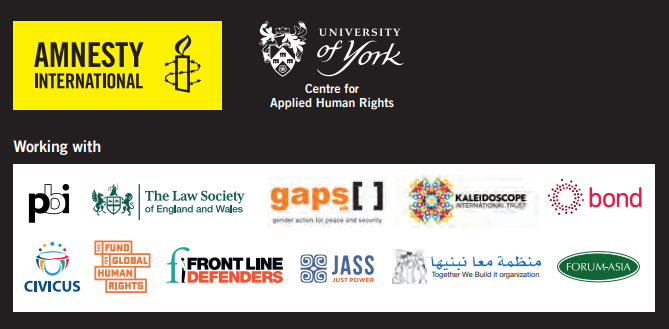Article by PBI-Canada

Amnesty International UK and the Centre for Applied Human Rights (CAHR) have produced this new report working with Peace Brigades International-UK and several other organizations including Civicus and Front Line Defenders.
The report – ‘On the human rights frontline – How the UK Government can defend the defenders’ – found that 94 per cent of the 82 human rights defenders interviewed said that they had experienced threats, harassment, abuse or death threats, but only 6 per cent said they had received support from the UK government in the context of those threats.
In the media release for the report, PBI-UK Director Susi Bascon says:
“With foreign office budgets cut to the bone, now more than ever the UK government needs to see human rights defenders as key workers fighting on the frontlines for free and open societies. The government should put a strategy to protect and partner with HRDs front and centre of its foreign policy, not just to honour the UK’s long tradition of human rights, but to help support its efforts to promote the rule of law and freedom of the press. Working hand in hand is a win-win situation that we can no longer ignore.”
The human rights defenders interviewed for this report come from seven different countries including Colombia where PBI has accompanied defenders since 1994.
The report notes: “The Covid-19 pandemic has exacerbated existing human rights abuses across the world and provided fresh opportunities for repressive governments to further restrict already shrinking civic and political spaces.”
It then highlights: “In Colombia, the pandemic has hidden from view the violence faced by human rights defenders and the lack of protection provided by the authorities. Some told Amnesty International that the authorities have reduced protection arrangements such as the provision of bodyguards and nightly patrols during this period, while at the same time giving the go-ahead for activities that increase the risk to communities, such as the extraction of natural resources, police operations, and the forced eradication of illicit crops.”
Among some of the recommendations in the report:
– “UK ministers will raise the importance of the work of human rights defenders and their protection needs in bilateral meetings with states, and at multilateral spaces such as Commonwealth events.”
– “The UK will make it easier for human rights defenders harmed by the operations of UK companies abroad to get access to remedy in the UK via judicial and non-judicial mechanisms.”
– “The UK will call for and support the development of collective protection mechanisms where appropriate and in response to calls from human rights defenders.”
– “The UK will expand, develop and disseminate information about ‘rest and respite’ schemes for human rights defenders in the UK, including facilitating access to temporary visas for human rights defenders at risk.”
The report also notes that the policy document UK Support for Human Rights Defenders was produced in 2019, but that “it is no substitute for a considered and comprehensive strategy to support human rights defenders” and further points out that only 11 per cent of the 82 defenders interviewed had heard of the document.
The full 28 pages ‘On the human rights frontline – How the UK Government can defend the defenders’ report can be read here. To read news coverage of the report in The Guardian, please click here.


